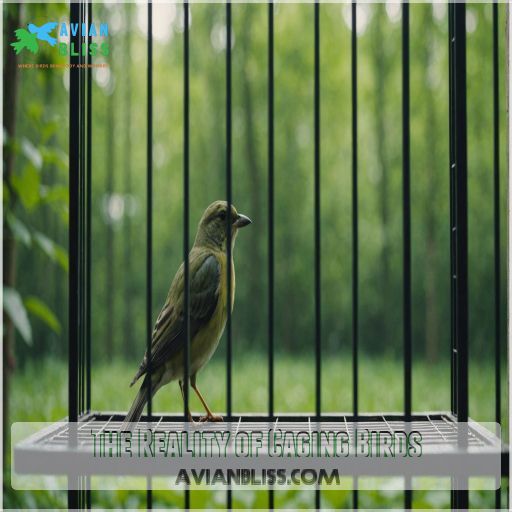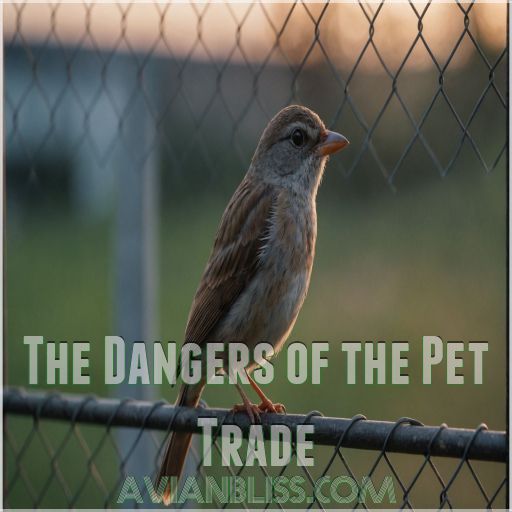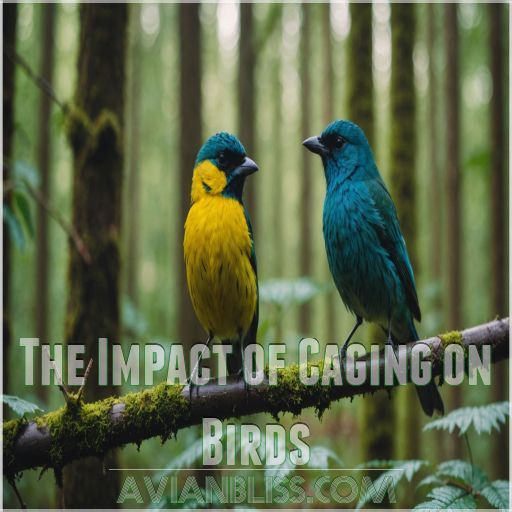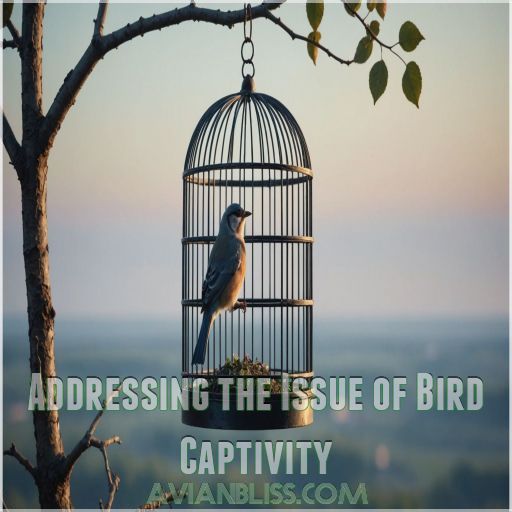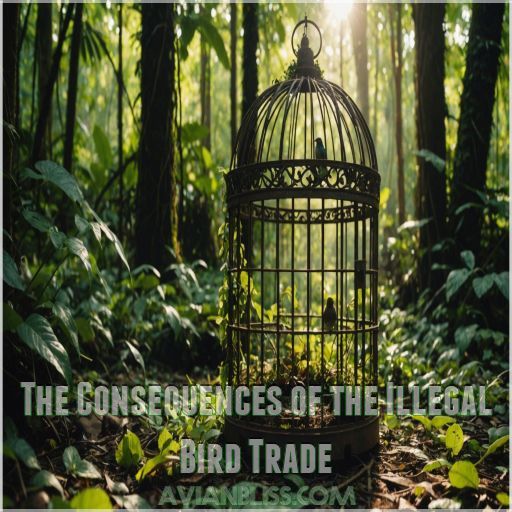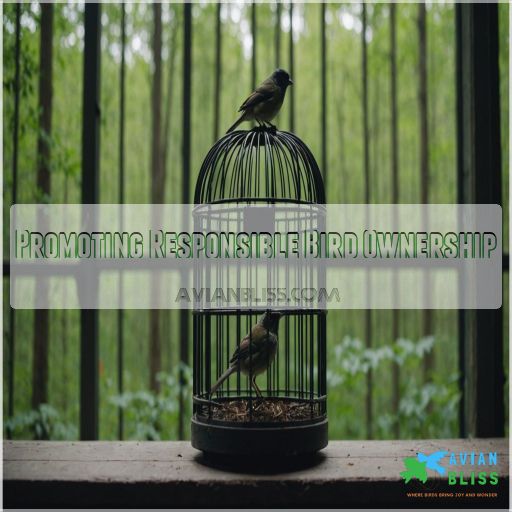This site is supported by our readers. We may earn a commission, at no cost to you, if you purchase through links.

Birds thrive on flying, socializing, and stretching their wings. Locking them in cages strips away their basic needs, often leading to stress and strange behaviors like feather plucking.
While owning a bird is a big responsibility, considering their well-being is super important. Thinking of caging a bird? It’s essential to weigh the ethical concerns and their need for freedom.
Curious about the full picture? Let’s soar into more details.
Table Of Contents
- Key Takeaways
- The Reality of Caging Birds
- The Dangers of the Pet Trade
- The Impact of Caging on Birds
- Addressing the Issue of Bird Captivity
- The Consequences of the Illegal Bird Trade
- Promoting Responsible Bird Ownership
- Frequently Asked Questions (FAQs)
- Is it cruel to keep birds in cages?
- Are caged birds a form of animal cruelty?
- Are caged birds aggressive?
- How are caged birds smuggled into the United States?
- Is it cruel to cage a bird?
- Is it sin to keep birds in cages?
- Is caging animal cruelty?
- Is it cruel to cage wild animals?
- How do caged birds affect mental health?
- What health issues arise from bird captivity?
- How does smuggling impact wild bird populations?
- Are there alternatives to bird cages for pets?
- How can adopting affect a former caged bird?
- Conclusion
Key Takeaways
- Think about how birds are meant to fly and socialize. Keeping them in cages can be a bit like stuffing you in a closet for life—limiting their natural instincts and leading to stress and weird behaviors, such as feather plucking. It’s not just about having a pet; it’s about understanding their needs and providing them with freedom.
- If you’re considering getting a bird, remember that their well-being comes first. Enrichment activities, like toys and social interactions, are vital. You wouldn’t want to be trapped with nothing to do, right? Well, birds feel the same way!
- Caging birds can be compared to clipping the wings of their spirit. Many birds suffer mentally and physically in small, uninteresting spaces. Think of adopting from rescue shelters—giving a bird a better life is where the real joy of bird ownership lies.
- Supporting ethical breeding and being aware of illegal wildlife trading can make all the difference. We want to avoid scenarios where bird-breeding mills prioritize making money over the well-being of the birds. So, do your homework and choose wisely.
The Reality of Caging Birds
Caging birds can have devastating consequences for their physical and mental well-being.
From depriving them of their natural ability to fly to causing abnormal behaviors, the reality of bird captivity is a complex and often troubling issue.
Depriving Birds of Natural Behavior
Imagine being a flightless bird in a cramped cage—it’s no picnic. Birds are natural explorers, and confinement limits their space and freedom, which impacts their behavior. Without enrichment, like toys or mirrors, and social interaction, they’re deprived of essential experiences.
This bird captivity raises ethical concerns:
- Limited Space
- Cage Enrichment
- Social Deprivation
- Bird Behavior Changes
- Natural Behavior .
Physical and Emotional Suffering
Birds, akin to social butterflies, suffer greatly when confined in cages too small or poorly designed.
Feather plucking and heightened stress levels often emerge from boredom and social isolation, turning their vibrant personalities into a shadow of themselves.
Ignoring their need for bird socialization and enrichment can be seen as bird neglect, bordering on bird abuse.
A bird’s health thrives in a nurturing, interactive environment.
Abnormal Behaviors and Health Issues
When birds are caged, stress-induced illnesses like feather plucking and aggression often surface.
These intelligent creatures express their unhappiness through abrupt changes in vocalization, or worse, slip into depression and lethargy.
Imagine a bird’s vibrant spirit dwindling just because its wings are clipped.
Understanding bird care means granting them their basic rights and respecting animal welfare and providing them with their basic needs, in a way that preserves their vibrant spirit.
Confinement and Social Isolation
Abnormal behaviors don’t just come from confinement; social isolation plays a part too.
When kept in cages, birds experience stress akin to avian depression.
To counter this:
- Cage Size: Provide ample space.
- Enrichment: Provide toys and activities.
- Socialization: Offer interaction with fellow birds.
- Humane Enforcement: Uphold ethical considerations to prevent animal cruelty.
[Citations: 1, 2, 3]
Basic Rights and Needs of Birds
Amid confinement and social isolation, you’ll see that birds deserve rights like any living being.
These include the freedom to soar in open skies, feast on a natural diet, and form social bonds.
Proper housing and enrichment needs contribute to their well-being.
Is caging birds animal cruelty? It certainly raises eyebrows among animal activism and bird ownership communities.
The Dangers of the Pet Trade
In the pet trade, birds often face neglect and abandonment, turning what should be a joyful experience into a sorrowful reality.
Picture the chaos of a crowded bird-breeding mill, where profits soar, but bird welfare crashes faster than a parrot learning to skateboard.
Neglect and Abandonment of Birds
Sadly, many pet birds end up neglected or abandoned, often due to owners underestimating the commitment required . Shelters are overwhelmed, and birds face rehoming challenges like high costs and specialized care needs.
But you can make a difference – support ethical breeders, adopt rescues, and educate yourself on proper bird care. Together, we can prevent bird suffering.
MGL c. 272, 77 Animal cruelty
330 CMR 30 Animal rescue and shelter organization regulations
Animal laws and regulations in Massachusetts, Mass. Animal Fund, Mass. Dept. of Agricultural Resources, Division of Animal Health, 2022.
Rehoming Challenges and Risks
You might think finding suitable homes for rehomed birds is a walk in the park, but it’s more like searching for needles in a haystack. Here are three issues.
Matching personalities isn’t easy; birds aren’t just feathered roommates .
Lack of knowledge can lead to neglect.
Birds bring potential financial burdens you can’t ignore.
Captive-Bred Birds From Bird-Breeding Mills
Rehoming birds often reveals the tough reality of bird breeding mills. These mills churn out captive-bred birds like assembly lines, prioritizing numbers over health. Imagine living in a packed subway car, never leaving it! That’s life in a mill.
Consider alternatives like adopting rescues or educating yourself on bird health concerns.
| Consideration | Bird Breeding Mills | Adoption/Rescue |
|---|---|---|
| Environment | Crowded, stressful | Supportive, enriching |
| Bird Health Concerns | High | Typically healthier |
| Consumer Awareness | Low, often misled | Encouraged, enlightened |
Stay aware and seek better options! (Source)
Prioritizing Profit Over Bird Welfare
Bird breeding mills often focus on profit over welfare, leaving our feathered friends in the lurch. Here’s the scoop:
- Black market trade thrives, jeopardizing bird welfare laws and biodiversity.
- The capture of wild birds, including species like crows, regulated by wildlife conservation laws, often fuels this trade. Many birds are taken from their natural habitats, disrupting ecosystems and impacting their populations.
- Ethical alternatives like adoption remain overlooked.
- Consumer awareness can spark change—let’s fly away from ignorance and make informed choices that benefit birds and biodiversity alike.
Health Issues and Behavioral Problems
Profit-driven practices often ignore the complex needs of caged birds, leading to feather plucking, aggression, and stereotypical behaviors.
Imagine being trapped in a tiny space, deprived of social interactions—hello, anxiety and depression!
These birds, like overwound toys, struggle with the constant demand for attention and love, manifesting issues that highlight captivity’s impact on their wellbeing.
The Impact of Caging on Birds
When you imagine a bird soaring freely in the sky, it’s hard to think that cramming it into a cage could ever feel like home.
Caging birds limits their natural movement and flight, causing stress and anxiety; they really miss that endless sky for stretching their wings and expressing their true selves.
Limiting Natural Movement and Flight
Confinment of birds has a profound impact on their physical and mental well-being. Confining birds restricts their natural flight instincts, leaving them flightless and unfulfilled. It’s like clipping their wings before they ever get the chance to soar.
- Cage Size: Too small for exercise needs.
- Wing Clipping: Hinders development.
- Exercise Needs: Unmet, causing weak muscles.
- Natural Flight Instincts: Suppressed.
- Developmental Delays: Affect physical and mental growth (Source).
Stress and Anxiety in Captivity
Caging birds can take a serious emotional toll, leaving them stressed and anxious.
These intelligent creatures thrive on freedom and social interaction, so the isolation and confinement of captivity can lead to concerning behavioral changes.
Like feather plucking and self-mutilation, these changes can be a result of the isolation, .
With patience and the right environment, however, your feathered friend can still live a fulfilling life.
Importance of Social Interaction and Enrichment
Fostering bird companionship in enriched cages can be as enjoyable as a gentle breeze on a hot day.
Birds, like us, need socialization benefits—playtime and enriched environments truly elevate their spirits.
Imagine a bird thriving from little bird playtime, flitting around like it’s in its own avian theme park.
Such enrichment for birds is essential for their happiness.
Providing Ample Space and Proper Care
You know, birds don’t just need a cozy spot; they thrive with ample space and proper care.
Imagine being stuck in a tiny room all day—it’s no fun!
Larger cage sizes, enrichment items, a proper diet, and social interaction can make a world of difference.
And don’t forget regular veterinary care—it’s like a spa day for their health and happiness.
Addressing Ethical Concerns and Promoting Welfare
While providing ample space and proper care keeps birds healthy, it’s essential to tackle ethical concerns and promote welfare, especially for social birds like parakeets in isolation
.
Imagine living in a tiny room your whole life—birds feel it too!
Support bird sanctuaries and ethical breeding. Stand against wildlife trafficking through responsible ownership.
Enhance bird enrichment with toys and social interactions, ensuring a fulfilling life with opportunities to spread those wings!
Addressing the Issue of Bird Captivity
When you think about keeping birds in cages, it’s natural to wonder if it’s fair or harmful.
Let’s explore the pros and cons, keeping bird happiness at the heart of the discussion—after all, even birds deserve a chance to spread their wings and soar!
Debating the Cruelty of Caging Birds
Imagine being a bird, longing for the sky, only to find yourself behind bars. Captivity can bring out behaviors like repetitive movements and feather plucking—a sign of stress and anxiety—and ethical dilemmas arise when considering bird welfare.
To address this, understand:
- Social isolation and its effects
- Physical and emotional suffering
- The legal framework surrounding bird captivity .
Arguments for and Against Caging
Birds, with their wings clipped, are denied the joy of flight, leading to stress and anxiety in cages.
The ethics of this are clear: confinement stifles their natural behaviors and requires spaces that provide enrichment.
Despite arguments for captivity’s benefits, like protection from poachers, alternative approaches respect a bird’s freedom while addressing conservation needs.
Prioritizing Bird Needs and Welfare
Your feathered friends deserve the best care. To prioritize their welfare, provide ample space for natural behaviors like flying and flocking. It’s essential to recognize that 60% of bird owners are unaware of their feathered friends’ basic needs, often leading to unintentional cruelty through ignorance of bird needs. So, educating yourself on their complex needs is vital to make sure you’re not causing harm.
Offer enrichment activities, a balanced diet, and regular vet check-ups. Most importantly, treat them as the intelligent, complex creatures they’re – not just pretty pets behind bars.
- Make sure each bird has enough room to spread their wings and move freely.
- Offer toys, perches, and activities to stimulate their curious minds.
- Consult an avian vet to make sure your bird’s physical and emotional needs are met.
Encouraging Responsible Ownership and Care
Taking a cue from your bird’s basic rights, encourage responsible ownership by ensuring ample Cage Size and Bird Enrichment. A balanced Bird Diet and regular visits to an Avian Vet keep them chirping!
Engage with Community Support groups for tips and tricks.
Remember, a bored bird is like a fish out of water—nobody wants that, as it is a sign of a lack of Community Support.
Supporting Conservation and Rescue Efforts
While many bird species are threatened by habitat loss and climate change, as seen in the latest bird conservation efforts, one can’t underestimate the role of bird sanctuaries and rescue groups in supporting conservation programs.
They help protect birds from wildlife trafficking and encourage ethical breeding practices.
If you stand by these organizations, you’d be part of a tribe working for a better world for birds, nurturing their natural freedom and ensuring their survival .
The Consequences of the Illegal Bird Trade
In the bird trafficking scene, you’re up against a smuggling operation that treats colorful parrots like contraband cargo, hidden in unbelievable ways.
Imagine these wild creatures, meant to soar the skies, packed like sardines, their health and happiness swapped for quick cash.
Wild-Caught Birds and Smuggling Methods
Imagine your beloved bird trapped in a net, en route to a smuggler’s den.
Wildlife trafficking employs cunning smuggling techniques on illegal trade routes, skirting CITES regulations and pushing endangered species closer to oblivion.
It’s a vicious cycle, often run by transnational networks, causing both ecological disruption and legal dilemmas as authorities grapple for control.
Targeted Species and Their Plight
When smugglers capture wild birds, many targeted species like parrots face dire consequences.
This illegal trade leads to habitat loss and risks their extinction.
- Endangered Species: Rare birds become even rarer.
- Illegal Trade Networks: Smuggling exploits high demand.
- Conservation Efforts: Critical for reversing damage.
Protecting birds means preserving beauty and balance.
Health Issues and Stress in Captivity
Life in a cage can be a bird’s own prison, leading to feather plucking and avian depression. A tiny cage size isn’t just a tight squeeze—it’s a recipe for loneliness and mental health woes.
Think of caged birds as prisoners, unable to spread their wings and fly, battling stress with every chirp.
| Challenge | Impact |
|---|---|
| Feather Plucking | Physical Damage |
| Cage Size | Restricted Life |
| Loneliness | Avian Depression |
Population Decline and Extinction Risks
The illegal bird trade poses a grave threat to parrot populations.
With 28% of species classified as Threatened , factors like habitat loss, hunting, and trafficking contribute to population declines, putting many parrots at risk of extinction.
Protecting these intelligent, vibrant creatures requires urgent action to curb the devastating impact of the illegal trade.
Economic and Ethical Implications
Bird populations face a drastic hit from wildlife trafficking, not just from extinction risks but also from economic and ethical standpoints.
This avian trade harms bird welfare, while ethical breeding and proper bird care practices avoiding aerosol poisoning fade into the background
.
With illicit profits overshadowing bird conservation, the need for more responsible practices is loud and clear, a call to protect our feathered friends.
The issue highlights the importance of addressing wildlife trafficking to prevent further harm to bird populations from an economic and ethical standpoint .
Promoting Responsible Bird Ownership
You’re thinking about getting a bird, but you’re worried about the ethics of caging them and want to make a responsible choice.
By checking documentation for captive-bred status, supporting ethical breeding, and considering adoption, you can help make sure your feathered friend has a happy, healthy life.
While saving yourself from the guilt of unintentionally supporting the illegal bird trade, and ensuring your feathered friend has a happy life.
Verifying Captive-Bred Status and Documentation
When you’ve got a bird that claims it’s captive-bred, don’t just wing it—verify its status.
Check for:
- Metal leg bands with unique identifiers.
- Legal proof like microchips or registration forms.
- Proper documentation from ethical breeders.
- Accurate bird identification records.
These steps make sure you’re not stuck with an illegal feathered friend, avoiding hefty fines! .
Supporting Ethical Breeding Practices
Supporting ethical bird breeders means prioritizing bird welfare over profit.
Picture it: an ethical breeder adheres to bird welfare standards, plays by bird breeding regulations, and avoids breeding mills like a cat avoids water.
By ensuring ethical breeder certification, you’re part of creating a better world for our feathered friends, supporting responsible breeding practices that don’t clip their wings—literally or metaphorically , which helps in creating a better world.
Encouraging Adoption and Rescue
Instead of buying, why not consider adopting birds, freeing them from tough situations?
Think of these steps like freeing canaries from a coal mine:
- Join local rescue organizations. They connect you with birds needing homes .
- Visit nearby sanctuaries. See firsthand the benefits of a bird sanctuary.
- Learn the adoption process.
- Understand rehoming challenges and ethical breeding.
Educating Yourself on Bird Welfare and Needs
Rescue is commendable, but understanding bird welfare is key to responsible ownership.
Knowing about bird enrichment, communication, diet, and avian diseases makes sure your feathered friends aren’t just caged creatures but vibrant companions.
It’s not just about feeding and cleaning; it’s about creating a lively habitat. Remember, a happy bird sings.
Enjoying Wildlife Ethically and Responsibly
Enjoying wildlife ethically means more than just observing birds in their natural habitats. It’s about supporting conservation efforts, making responsible purchasing decisions, and advocating for habitat preservation.
- Choose eco-tourism over captive wildlife experiences.
- Adopt a rescue bird instead of buying from pet stores.
- Volunteer with local bird conservation groups.
- Spread awareness about the plight of wild-caught birds. (Source)
Frequently Asked Questions (FAQs)
Is it cruel to keep birds in cages?
Keeping birds in cages can indeed be considered cruel, as these social, intelligent creatures thrive on freedom.
Confinement may lead to stress, anxiety, and abnormal behaviors, depriving them of flying and interacting naturally .
Are caged birds a form of animal cruelty?
Caging birds can feel like locking a child in a closet for life.
They crave freedom and social interaction, not solitude, which can lead to distress.
Self-destructive behaviors can also occur, making it a form of animal cruelty.
Are caged birds aggressive?
Caged birds can exhibit aggressive behavior due to stressful environments and lack of natural stimuli.
Like us, they too crave freedom and emotional connections, sometimes becoming hostile when these needs aren’t met.
How are caged birds smuggled into the United States?
Birds are often smuggled into the U.S. hidden in creative ways, like hair curlers taped to the body or stuffed into fanny packs.
These methods, while crafty, highlight the lengths traffickers will go for profit.
Is it cruel to cage a bird?
Oof, caging birds can be a real head-scratcher, my friend.
While they may seem content at first, those feathery friends of ours really need room to spread their wings and soar.
Is it sin to keep birds in cages?
Keeping birds in cages isn’t universally considered a sin, but opinions vary.
Some view it as permissible if cared for properly.
Others see it as denying freedom, akin to clipping their spirit’s wings.
Is caging animal cruelty?
Imagine spending life in a shoebox; that’s the reality for many caged animals, leading to stress and suffering.
Caging often denies animals their natural behaviors, making it a form of cruelty.
Is it cruel to cage wild animals?
Caging wild animals is a recipe for stress and confusion.
They’re born to roam, not to be boxed in tight quarters.
No matter the cage’s size, they can’t truly express their natural behaviors or instincts.
How do caged birds affect mental health?
When birds are housed, they may experience feelings of restlessness, akin to being cooped up all winter.
Wing clipping can reduce mobility and natural behaviors, potentially leading to stress and feather-picking behaviors .
It can also potentially lead to stress.
What health issues arise from bird captivity?
Keeping birds in captivity often leads to health issues like behavioral problems, nutritional deficiencies, and infections due to wild bird confinement
.
Inadequate space and mental stimulation can cause stress, leading to harmful behaviors like feather plucking and aggression.
How does smuggling impact wild bird populations?
Smuggling birds is akin to a thief in the night, silently draining wild populations.
This illegal trade devastates species, pushing them to the brink of extinction and disturbing ecosystems, all driven by greed and high demand.
Are there alternatives to bird cages for pets?
Rather than caging your feathered friend, consider a spacious aviary or bird-proofed room where they can spread their wings freely.
Provide plenty of toys, perches, and safe spaces to explore – your bird will thank you!
How can adopting affect a former caged bird?
Adopting a former caged bird lets you set the stage for its second act of freedom.
You might see behaviors like feather-picking improve as your feathered friend adjusts to more space and companionship.
Conclusion
When faced with the question, "Is caging birds animal cruelty?" remember that no bird is an island.
By caging birds, you might limit their natural behavior and spirit.
Prioritize understanding and meeting their physical and social needs to make sure they’ve a happy, healthy life.
Think critically about your role in the life of a pet bird, and consider adopting or supporting responsible breeders and rescues.
With compassion and care, you can help make a positive impact on avian lives by being a responsible and responsible breeders.

